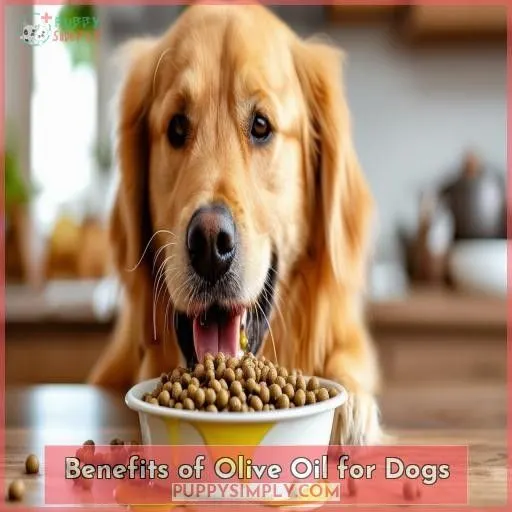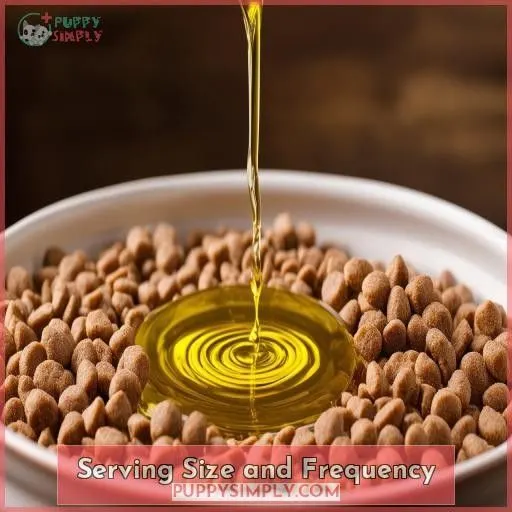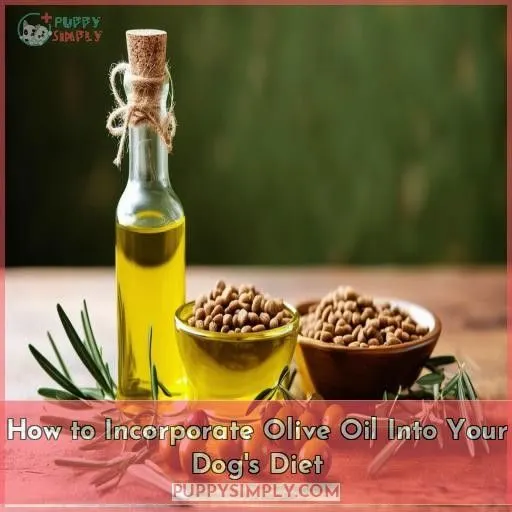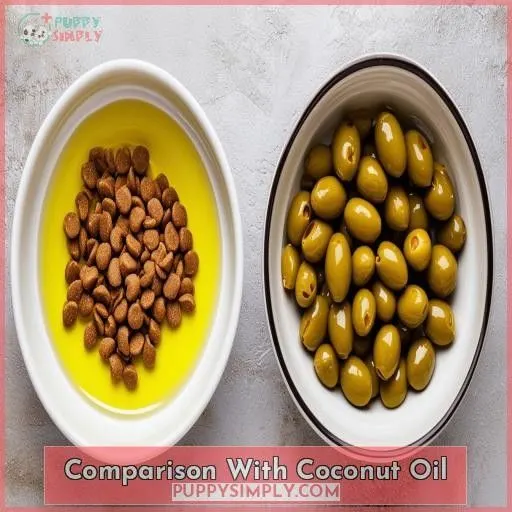This site is supported by our readers. We may earn a commission, at no cost to you, if you purchase through links.
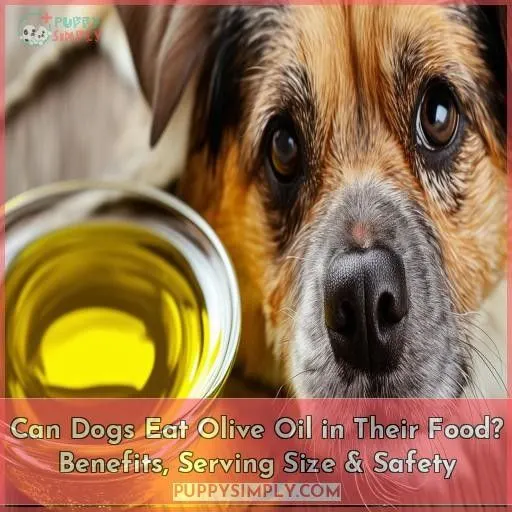
Olive oil provides numerous benefits for dogs, including enhanced skin and coat health, aiding weight management, boosting appetite, and supporting immune and cognitive function.
Start by mixing in small amounts, gradually increasing to around 1 teaspoon per 10 pounds of body weight daily. However, monitor for any digestive issues and make sure it doesn’t lead to weight gain.
While safe in moderation, olive oil shouldn’t replace a balanced diet. Consult your vet to incorporate it properly – they may suggest alternating it with other healthy oils too.
Table Of Contents
- Key Takeaways
- Can Dogs Eat Olive Oil in Their Food?
- Benefits of Olive Oil for Dogs
- Serving Size and Frequency
- Safety Considerations
- How to Incorporate Olive Oil Into Your Dog’s Diet
- Comparison With Coconut Oil
- Choosing a High-Quality Olive Oil
- Consulting With Your Veterinarian
- Frequently Asked Questions (FAQs)
- How much olive oil can I give my dog?
- Is it safe to put olive oil in dog food?
- Is coconut oil or olive oil better for dogs?
- What oil can I add to my dog’s food?
- Is olive oil safe for puppies?
- Can olive oil cause pancreatitis in dogs?
- Does olive oil help with dog allergies?
- How does olive oil compare to fish oil?
- What are the signs of olive oil intolerance?
- Conclusion
Key Takeaways
Olive oil offers a wealth of benefits for our canine companions, like nourishing their skin and coat, boosting their appetite, and supporting their immune system – it’s like a tasty multivitamin for pups!
When introducing olive oil to your dog’s diet, start with small amounts and gradually increase to avoid any tummy troubles. A little goes a long way, just like a puppy’s boundless energy!
Always consult with your trusty vet before making any major changes to your furry friend’s diet. They know your pup’s unique needs and can guide you on the best way to incorporate olive oil safely.
Don’t forget, olive oil is a delicious addition to your dog’s diet, but it shouldn’t replace their regular, balanced meals. Think of it as a tasty topping, not the main course!
Can Dogs Eat Olive Oil in Their Food?
Yes, dogs can eat olive oil in their food. Olive oil provides beneficial fats for a dog’s skin, coat, and overall health, but it should be given in moderation as part of a balanced diet.
Benefits of Olive Oil for Dogs
Incorporating olive oil into your dog’s diet offers several health benefits. You’ll find it enhances their skin and coat health, aids in weight management, boosts appetite, and supports immune and cognitive function, making it a valuable addition to their meals .
Skin and Coat Health
Olive oil’s nourishing properties and antioxidants are fantastic for your dog’s skin and coat. It retains moisture, relieves dry skin, and enhances coat shine. The anti-inflammatory benefits help keep your dog’s skin healthy and vibrant, promoting overall skin health and radiance.
Weight Management
To promote weight management, olive oil can help break down fat cells, reduce belly fat, and prevent overeating in dogs. The recommended serving size is critical; start with small amounts and gradually increase to one teaspoon per ten pounds of body weight daily.
Appetite Enhancement
To boost your dog’s appetite, consider adding extra virgin olive oil to their meals. Its rich flavor enhances food appeal, making it more attractive to picky eaters. This enrichment adds taste preference and supports digestive health by neutralizing free radicals (Source).
Immune System and Cognitive Health
Olive oil benefits your dog’s immune system and cognitive health. It contains Antioxidants that protect against free radical damage, reducing inflammation and possibly cognitive decline.
- Supports immune system health
- Enhances brain function
- Reduces inflammation
- Promotes heart health
Serving Size and Frequency
To determine the serving amount of olive oil for your dog, start with small amounts and gradually increase.
Begin by adding 1 teaspoon of Extra virgin olive oil for every 10 pounds of your dog’s body weight daily. Alternatively, you can offer it weekly in similar proportions.
You can rotate olive oil with coconut oil or fish oil to provide variety and additional health benefits.
Simply mix the oil into your dog’s food or drizzle it over meals for easy incorporation (Source).
Safety Considerations
When feeding your dog olive oil, it’s essential to be aware of potential risks like weight gain, diarrhea, and digestive issues. Additionally, olive oil should complement, not replace, a balanced diet to make sure your dog gets all necessary nutrients.
Potential Risks: Weight Gain, Diarrhea, Digestive Issues, Allergic Reactions
When adding olive oil to your dog’s diet, be aware of potential risks. Olive oil can cause allergic reactions, leading to symptoms like itching or swelling.
Digestive issues such as diarrhea and vomiting may occur if introduced too quickly.
Overfeeding olive oil can contribute to weight gain, making obesity a concern.
Always introduce it gradually and monitor your dog for any adverse reactions to guarantee their safety and well-being.
Consult with your veterinarian to determine the best approach for your specific dog’s needs.
Should Not Replace a Balanced Diet
Though olive oil offers numerous health benefits, it shouldn’t replace a balanced diet for your dog. To guarantee a healthy, well-rounded diet, you should maintain an appropriate serving size according to your dog’s weight and observe for any digestive issues, weight gain, or allergic reactions.
- Nutritional Balance: Ensure olive oil is only a supplement, not a primary food source.
- Monitor Health: Watch for signs of digestive discomfort or weight changes.
- Consult a Vet: Seek professional advice to tailor your dog’s diet effectively.
Prioritize complete nutrition along with olive oil benefits.
How to Incorporate Olive Oil Into Your Dog’s Diet
To incorporate olive oil into your dog’s diet, start with small amounts and gradually increase to the recommended serving size. You can mix it into their food, drizzle it on top, or use it in homemade dog treats.
Start With Small Amounts
When starting, use a small amount of olive oil, about a quarter teaspoon. Incorporate it by mixing into your dog’s food for even distribution. This initial dosage helps monitor for any adverse reactions early on.
Gradually Increase to Recommended Serving Size
Gradually increasing the serving size of olive oil in your dog’s diet helps prevent issues such as dog allergies, digestive problems, and weight gain.
- Start with a few drops
- Monitor for reactions
- Slowly increase weekly
- Aim for 1 teaspoon per 10 pounds
Mix Into Food
Mixing olive oil into your dog’s food can be a simple and effective way to introduce it to their diet. Start with small amounts and gradually increase to the recommended serving size for best results.
| Serving Size | Small Dogs | Medium Dogs | Large Dogs |
|---|---|---|---|
| Initial Amt | 1/4 tsp | 1/2 tsp | 1 tsp |
| Week 1 | 1/2 tsp | 1 tsp | 1.5 tsp |
| Week 2 | 3/4 tsp | 1.5 tsp | 2 tsp |
| Week 3 | 1 tsp | 2 tsp | 1 tbsp |
Drizzle Over Food
Drizzling olive oil over your dog’s food is an easy way to add benefits like weight loss support and improved coat health. Start with a small amount, gradually increasing to the recommended serving size for best results.
Use in Homemade Dog Treats
Using olive oil in homemade dog treats can provide multiple benefits. Simply mix it into your recipe to enhance your dog’s skin, coat, and digestion, while also offering a tasty and nutritious treat to enjoy.
Comparison With Coconut Oil
Both olive oil and coconut oil offer health benefits for dogs, but coconut oil may be more effective for specific issues like improving skin conditions or treating digestive problems. Always consult your veterinarian to determine which oil best suits your dog’s individual needs and health conditions.
Both Have Health Benefits for Dogs
Both olive oil and coconut oil have notable health benefits for dogs. Olive oil offers anti-inflammatory effects, aids digestion, and can help in cancer prevention. It also lubricates joints and nourishes the skin. Coconut oil, known for its antimicrobial properties, can complement the benefits of olive oil, depending on your dog’s specific needs (Source).
Coconut Oil May Be Better for Certain Conditions
Coconut oil might be better for specific conditions your dog faces. Consider it for:
- Skin conditions: It nourishes and heals dry or damaged skin.
- Weight loss: Aids in breaking down fat cells.
- Appetite stimulation: Enhances food appeal.
- Cognitive decline: Supports brain health.
- Cancer prevention: Contains compounds that kill cancer cells.
Consult With Your Veterinarian for Personalized Recommendations
When deciding between olive oil and coconut oil for your dog’s diet, it’s critical to consult with your veterinarian. They can provide personalized recommendations based on your dog’s specific health conditions. Monitor your dog’s response to either oil, adjusting as needed for maximum benefits and safety.
| Criteria | Olive Oil | Coconut Oil |
|---|---|---|
| Health benefits | Anti-inflammatory | Antimicrobial |
| Serving size | 1 tsp per 10 lbs | 1 tsp per 10 lbs |
| Safety considerations | Monitor weight gain | Diarrhea observation |
Choosing a High-Quality Olive Oil
When choosing a high-quality olive oil for your dog, look for extra-virgin varieties like Colavita Premium Extra Virgin Olive Oil. It’s important to select oils that are free from chemical processing to guarantee the healthiest option for your pet.
1. Colavita Premium Extra Virgin Olive Oil
Colavita Premium Extra Virgin Olive Oil, made from a blend of olives from Italy, Greece, Spain, and Portugal, is a top choice for your dog. Its fruity and spicy taste enhances their food without overwhelming them.
Proper storage is key to maintaining its quality; keep it in a cool, dark place. The product is certified by NAOOA and IOC, ensuring purity. It comes in a plastic bottle, making it convenient to handle and store.
Avoid overuse to prevent weight gain or digestive issues.
Consulting With Your Veterinarian
Before adding olive oil to your dog’s diet, discuss your dog’s specific needs and health conditions with your veterinarian. Monitor your dog closely for any adverse reactions, such as weight gain or digestive issues.
Discuss Your Dog’s Specific Needs and Health Conditions
Before adding olive oil to your dog’s diet, consult your vet. They’ll consider:
- Your dog’s age, breed, and any medical conditions
- Potential allergies or sensitivities to olive oil
- The best dosage based on your dog’s size and needs
Together, you can determine if olive oil suits your furry friend, addressing concerns like:
- Joint pain or skin issues that olive oil may help
- Puppies’ developmental needs
- Safe serving sizes for satisfactory benefits
Your vet understands your dog’s unique requirements, ensuring olive oil enhances their wellbeing safely.
Monitor Your Dog for Any Adverse Reactions
As with any new food, it’s important to monitor your pup closely when introducing olive oil.
Watch for signs of allergic reactions like itching, vomiting, or diarrhea. Digestive upset or weight gain despite following the recommended serving size could also indicate it’s not agreeing with your furry friend.
If you notice any concerning symptoms, discontinue use immediately and consult your vet. Checking in with your dog’s healthcare provider guarantees a safe and beneficial experience when adding olive oil to their diet.
Frequently Asked Questions (FAQs)
How much olive oil can I give my dog?
Start with 1 teaspoon per 10 lbs of body weight daily. Gradually increase to 1 tablespoon max. Mix EVOO into food or drizzle on top for a healthy coat and joints.
Is it safe to put olive oil in dog food?
Like a dog enthusiastically lapping up a treat, olive oil is safe and healthy for your pup’s diet. In moderation, it boosts their coat, aids digestion, and curbs inflammation—a tasty addition for overall wellness.
Is coconut oil or olive oil better for dogs?
Coconut oil, with its lauric acid and antimicrobial properties, is better than olive oil for dogs. However, olive oil provides heart-healthy fats that benefit their coats.
What oil can I add to my dog’s food?
You can add a teaspoon of extra virgin olive oil to your dog’s food for some healthy fats. It’s great for their skin, coat, and helps with weight management. Just start slow and monitor for any digestive issues.
Is olive oil safe for puppies?
Like a pup’s boundless energy, olive oil’s safety for puppies is a vibrant yes! But moderation is key—introduce slowly, a teaspoon per 20 lbs, for a nutritious coat and proper growth.
Can olive oil cause pancreatitis in dogs?
Yes, olive oil can potentially cause pancreatitis in dogs if given in excess. To avoid this, stick to small amounts – no more than a teaspoon per 10 lbs of body weight daily.
Does olive oil help with dog allergies?
Just like a soothing balm for irritated skin, olive oil can alleviate your pup’s allergies. Its anti-inflammatory properties calm rashes and itchiness, providing much-needed relief.
How does olive oil compare to fish oil?
While fish oil provides omega-3s, olive oil is a powerhouse of monounsaturated fats and antioxidants. It nourishes skin and coat, supports cognition, and may help manage weight – a versatile addition to your pup’s bowl.
What are the signs of olive oil intolerance?
Like a ship adrift, signs of olive oil intolerance are easy to spot – vomiting, diarrhea, and discomfort. Keep portions small, introduce it slowly, and discontinue if your pup seems worse for wear.
Conclusion
Picture your dog’s luscious coat gleaming in the sun after incorporating olive oil into their diet.
While olive oil shouldn’t replace a balanced diet, it offers numerous benefits when added in moderation.
Consult your vet to safely integrate olive oil and enhance your furry friend’s well-being.
Enjoy their improved skin, coat, and overall health from this nutrient-rich addition to their food.


